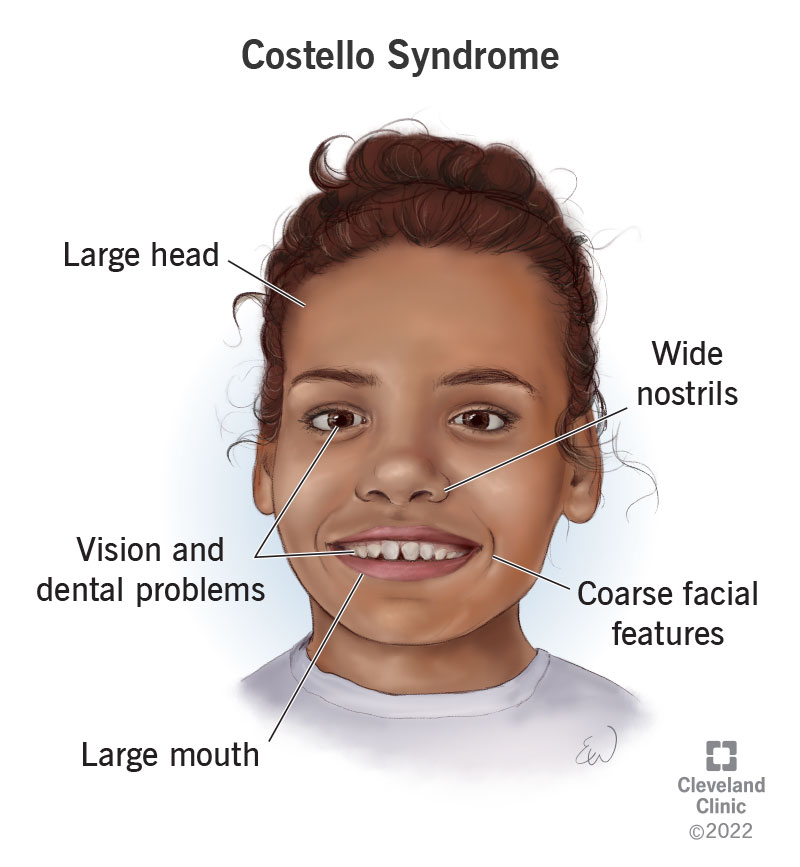Costello syndrome is a rare genetic condition that causes cells to divide and replicate faster than expected. This causes both cancerous and noncancerous tumors to form. Costello syndrome also affects the brain, bones, heart, muscles and skin. Treatment addresses symptoms of the condition and there’s no cure.
Advertisement
Cleveland Clinic is a non-profit academic medical center. Advertising on our site helps support our mission. We do not endorse non-Cleveland Clinic products or services. Policy
Costello syndrome is a rare genetic condition that affects multiple organs including the brain, bones, heart, stomach, muscles, kidneys and skin. A genetic change causes proteins to tell cells to grow and divide more often than they need to. Because cells are multiplying too quickly in Costello syndrome, you’re more at risk of developing cancerous or noncancerous tumors.
Advertisement
Cleveland Clinic is a non-profit academic medical center. Advertising on our site helps support our mission. We do not endorse non-Cleveland Clinic products or services. Policy
Costello syndrome is a rare condition that affects at least 100 to 1,500 people worldwide.

Image content: This image is available to view online.
View image online (https://my.clevelandclinic.org/-/scassets/images/org/health/articles/costello-syndrome.jpg)
Costello syndrome symptoms range in severity. Symptoms affect different parts of your body including your brain, bones, heart, muscles and skin. Symptoms may include:
People diagnosed with Costello syndrome have distinct physical characteristics like:
The genetic change responsible for a Costello syndrome diagnosis causes cells to continuously grow and divide. This causes tumors to form. Tumors can be cancerous or noncancerous (benign). Some of the most common types of tumors include:
Advertisement
A genetic change (mutation) of the HRAS gene causes Costello syndrome. The HRAS gene creates the H-Ras protein that’s responsible for cell growth and cell division. When the HRAS gene has a mutation, the protein’s power switch can’t turn off. This causes the protein to overwork by creating too many proteins that tell cells that they need to grow and divide more frequently than they should.
While you can inherit Costello syndrome from a parent, almost all cases of Costello syndrome are the result of a new genetic change that happens among people without any history of the condition in their biological family.
In rare cases of inheritance, Costello syndrome is autosomal dominantly inherited. This means that only one biological parent needs to have the gene change to pass it on to their child who’d have a 50% chance of inheriting it.
Costello syndrome could affect anyone. Although you can inherit the condition, most cases happen randomly or sporadically, without any history of the condition in someone’s family history (de novo).
A Costello syndrome diagnosis occurs in early childhood. Your healthcare provider will diagnose Costello syndrome after a physical examination of your child’s symptoms, followed by a genetic test to confirm the gene change responsible. Your provider will also ask if you have a history of any genetic conditions in your family since your child could inherit Costello syndrome.
Your provider’s diagnostic approach eliminates conditions that share the same symptoms. Physical symptoms of Costello syndrome are very similar to symptoms of both cardiofaciocutaneous syndrome (CFC syndrome) and Noonan syndrome. A genetic test to identify the gene responsible for symptoms sets each condition apart and leads to a complete diagnosis.
Treatment for Costello syndrome addresses symptoms of the condition since there’s no cure. Treatment could include:
Advertisement
Costello syndrome is a lifelong condition without a cure. People diagnosed with Costello syndrome have a varied life expectancy that’s dependent on the severity of their symptoms, especially symptoms that affect the heart. Treatment addresses symptoms as well as tumors that form as a result of your body’s cells dividing too frequently. The outlook is positive with early treatment.
It’s difficult to prevent Costello syndrome because the condition occurs randomly and is unpredictable. If you know genetic conditions like Costello syndrome run in your biological family, talk to your provider about genetic testing to understand your risk.
Visit your healthcare provider if your child diagnosed with Costello syndrome experiences symptoms that affect their ability to thrive, especially if they have problems eating.
Visit the emergency room immediately if your child experiences symptoms that affect their heart, including:
You may want to ask your healthcare provider:
Advertisement
It may be overwhelming to hear that your child has a rare genetic condition, but your healthcare provider will offer the best care possible to treat your child’s symptoms. This will help them lead a healthy life. It’s important to monitor your child for symptoms, especially small tumors that form on their body as a result of their cells overworking. Early treatment leads to the best outlook.
Advertisement

Sign up for our Health Essentials emails for expert guidance on nutrition, fitness, sleep, skin care and more.
Learn more about the Health Library and our editorial process.
Cleveland Clinic’s health articles are based on evidence-backed information and review by medical professionals to ensure accuracy, reliability and up-to-date clinical standards.
Cleveland Clinic’s health articles are based on evidence-backed information and review by medical professionals to ensure accuracy, reliability and up-to-date clinical standards.
As your child grows, you need healthcare providers by your side to guide you through each step. Cleveland Clinic Children’s is there with care you can trust.
